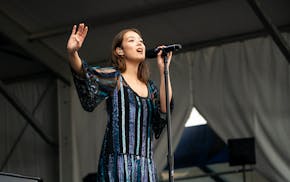If asked to name my three favorite sounds, I'd choose waves crashing against the rocky shoreline of Lake Superior, wind blowing through a boreal forest, and the section of the finale of Beethoven's Fifth Symphony where the violins gradually ascend upward in a striving spirit, one of music's consummate expressions of triumph over adversity.
If you've never heard a live performance of Beethoven's Fifth by a great orchestra, I'd suggest you seize the opportunity. The St. Paul Chamber Orchestra is playing it in both St. Paul and Minneapolis this weekend, and Friday's midday performance at the Ordway Concert Hall was as exhilarating as one could wish, a mix of musical adrenaline rushes and compelling conversations between sections and soloists within the orchestra that both thrilled and fascinated.
It was the climax of a program that showed off the SPCO as a marvelous sum of some very talented parts. Its winds offered music for meditation in Arvo Part's "Fratres" before the strings exquisitely executed Igor Stravinsky's music for the ballet, "Apollon musagete." But that all seemed prelude once the famous four notes that launch the Fifth sent pulses racing throughout the hall.
But let us give the concert's first half its due. Eight wind players from the orchestra (and percussionist Steve Kimball) captured the solemnity that Part brought to his "Fratres," a piece inspired by Gregorian chant and chiming bells.
And the Stravinsky was full of exceptional interplay among the musicians. His 1947 version of "Apollon musagete" sounds something like a colloquy among various musicians in the orchestra, and it provided a showcase for not only the splendid chemistry within the SPCO's strings, but also for the soloing skills of violinist Steven Copes and cellist Julie Albers.
The orchestra's ranks swelled to 42 for Beethoven's Fifth, and all the musicians rose to the challenge of performing this symphony without the aid of a conductor. While this gave the performance a more collaborative feel than you'll customarily get from watching an impassioned maestro enhance the visuals, there was never any question that concertmaster Copes was providing the cues at every key transition.
So it was likely his idea to take the symphony's first movement at such a brisk clip that there was no time for that initial "fate knocking at the door" theme to take on even a hint of bombast or ponderousness. That four-note motif proved exciting as it cascaded downward through the orchestra. Audible exhaling could be heard around the hall at the movement's conclusion, the SPCO then bringing tenderness to the symphony's slow movement.
A wildfire of energy ignited when the cellos and basses burst into the third movement's furious fugue. And there are few classical concert experiences as cathartic as the supernova of the finale's opening strains: The bright explosion of sound might be Beethoven's ultimate expression of emerging from darkness into joyous light.
That mood reached its apotheosis on that sound I spoke of loving so much. And no recording does justice to what it's like to experience that in concert.
St. Paul Chamber Orchestra
What: Works by Arvo Part, Igor Stravinsky and Beethoven
When and where: 7 p.m. Fri. and Sat., Ordway Center for the Performing Arts, 345 Washington St., St. Paul; 2 p.m. Sun., Ted Mann Concert Hall, 2128 S. Fourth St., Mpls.
Tickets: $16-$68 (students and children free), available at 651-291-1144 or thespco.org
Classical music writer Rob Hubbard can be reached at wordhub@yahoo.com.

Never mind the oldies — here are 10 younger acts to see this summer in Minnesota

Review: Conrad Tao delivers a thrilling Beethoven piano concerto with the Minnesota Orchestra

Gen Z jazz singer Laufey is headed to Target Center on Oct. 11

